
American Journal of Biological Anthropology
Scope & Guideline
Advancing Insights into Evolutionary Biology
Introduction
Aims and Scopes
- Human Evolution and Adaptation:
Research focused on the evolutionary processes that shape human morphology, behavior, and genetics, including studies on early hominins, Neanderthals, and modern human populations. - Biocultural Perspectives:
Exploration of the interplay between biological and cultural factors in shaping human health, behavior, and social structures, emphasizing how culture influences biological outcomes. - Primate Behavior and Ecology:
Studies examining the behavior, ecology, and social structures of non-human primates, providing insights into the evolutionary contexts of human behavior. - Paleoanthropology and Archaeology:
Research that integrates archaeological findings with biological data to understand past human societies, their diets, health, and interactions with the environment. - Forensic Anthropology and Bioarchaeology:
Application of biological anthropology methods to forensic cases and historical contexts, focusing on the analysis of human remains to infer health, lifestyle, and social dynamics. - Genomics and Genetics:
Investigations into the genetic basis of human traits and diseases, including studies on ancient DNA and population genetics that inform our understanding of human diversity and adaptation.
Trending and Emerging
- Ethics and Social Justice:
There is a growing emphasis on ethical considerations in research, particularly regarding the treatment of human remains and the implications of research on marginalized communities. - Environmental and Health Interactions:
Research linking environmental factors to health outcomes is trending, reflecting a broader interest in how climate change and urbanization impact human biology and health. - Interdisciplinary Approaches:
The integration of methods from genetics, ecology, and data science is emerging as a key theme, with researchers using advanced technologies to enhance traditional biological anthropology studies. - Microbiome Research:
The exploration of the human and non-human primate microbiome is gaining traction, focusing on how microbiomes influence health, behavior, and dietary practices. - Adaptation and Resilience Studies:
Studies examining how populations adapt to changing environments and the resilience of communities in the face of social and ecological challenges are increasingly prevalent.
Declining or Waning
- Classic Craniometry:
Historically a major focus in biological anthropology, craniometry is seeing reduced emphasis as more researchers turn to genetic and other biological methods for understanding human variation. - Purely Morphological Studies:
As interdisciplinary approaches gain popularity, studies relying solely on morphological analysis without integrating genetic or ecological data are becoming less common. - Traditional Forensic Techniques:
With advancements in technology and methodologies, the reliance on traditional forensic techniques is waning in favor of more integrated and innovative approaches, such as genetic analysis. - Historical Bioarchaeology:
Research that focuses solely on historical populations without considering contemporary implications or biocultural contexts is experiencing decreased interest.
Similar Journals
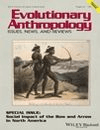
EVOLUTIONARY ANTHROPOLOGY
Exploring the Intersections of Anthropology and MedicineEVOLUTIONARY ANTHROPOLOGY is a premier journal published by WILEY, dedicated to advancing the field of anthropology through innovative and rigorous research. With an ISSN of 1060-1538 and an E-ISSN of 1520-6505, this journal boasts a remarkable Q1 ranking in both the Anthropology and Medicine (miscellaneous) categories, reflecting its significant impact within the academic community. Since its inception in 1992, it has continuously evolved, now encompassing a wide array of subjects pertinent to evolutionary studies and human health. Residing in the highly competitive Scopus rankings, it stands at an impressive rank of 10 out of 502 in the field, placing it within the top 2% of journals in Social Sciences - Anthropology. Researchers, professionals, and students alike will find this journal an invaluable resource for the latest findings, theoretical advancements, and discussions that shape our understanding of human evolution and its biological implications. While not categorized as an Open Access journal, EVOLUTIONARY ANTHROPOLOGY remains a vital outlet for high-quality scholarship, fostering dialogue and enriching knowledge across diverse audiences.

Annual Review of Anthropology
Illuminating Insights into Human SocietiesAnnual Review of Anthropology is a premier journal published by Annual Reviews, dedicated to providing comprehensive and authoritative reviews in the field of anthropology. Established with the goal of synthesizing essential research findings, this influential publication not only shapes contemporary anthropological discourse but also facilitates interdisciplinary dialogue within the broader realm of social sciences and cultural studies. With an impressive impact factor that places it in the Q1 category across multiple classifications, including Anthropology and Arts and Humanities, this journal is highly regarded by researchers and academics alike. The Annual Review of Anthropology has been a trusted resource for critical insights and transformative ideas, helping to advance the understanding of human societies from 1980 to the present. Although it does not offer open access, access to its articles is available through various academic institutions, ensuring that both seasoned scholars and students can benefit from its wealth of knowledge. With a Scopus ranking placing it in the top percentiles for relevant subjects, this journal is essential reading for anyone looking to stay at the forefront of anthropological research.

Anthropologie-International Journal of Human Diversity and Evolution
Charting the Course of Human Evolutionary StudiesAnthropologie-International Journal of Human Diversity and Evolution is a prominent peer-reviewed journal published by the esteemed MORAVIAN MUSEUM in the heart of the Czech Republic. With a focus on anthropology, this journal serves as a vital platform for the dissemination of innovative research that explores human diversity and evolutionary studies. The journal operates under a rigorous academic framework and is categorized in the Q3 quartile for anthropology in 2023, reflecting its significance in the field. Although it does not currently offer open access options, Anthropologie facilitates the exchange of knowledge through its carefully curated articles spanning diverse topics within human evolution. Its Scopus ranking (320 out of 502 in social sciences) underscores its role as a relevant source for scholars and professionals alike, fostering dialogue and advancements in understanding human diversity. Researchers, students, and practitioners can look forward to engaging content that not only enlightens but also inspires further inquiry into anthropological studies.

BMC Ecology and Evolution
Empowering discovery in ecology and evolution.BMC Ecology and Evolution is a premier open access journal published by BMC, dedicated to advancing our understanding of ecological and evolutionary processes in a rapidly changing world. With a growing e-ISSN of 2730-7182, this journal serves as a vital platform for researchers and scholars looking to disseminate high-quality research findings that explore the interplay between ecological dynamics and evolutionary developments. Operating from London, England, BMC Ecology and Evolution provides seamless access to valuable research, ensuring that significant studies are available to a global audience without barriers. The journal fosters a collaborative atmosphere, welcoming diverse research methodologies and interdisciplinary approaches, thus making it a crucial resource for professionals, students, and academics alike. Its commitment to open access ensures that pioneering research in ecology and evolution is readily available, encouraging the continuous exchange of ideas and knowledge in the field.
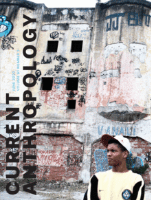
CURRENT ANTHROPOLOGY
Shaping the Future of Anthropological InquiryCURRENT ANTHROPOLOGY, published by the esteemed University of Chicago Press, stands as a premier journal in the fields of anthropology and archaeology, with an impressive impact factor that signifies its relevance and authority in the academic community. With both print (ISSN: 0011-3204) and digital formats (E-ISSN: 1537-5382), this journal provides a platform for groundbreaking research, theoretical advancements, and critical discussions that shape our understanding of human cultures and societies. Since its inception in 1962, CURRENT ANTHROPOLOGY has continually pushed the boundaries of knowledge and inquiry, earning a prestigious Q1 ranking in 2023 across multiple categories, including Social Sciences and Archaeology. Researchers and professionals alike rely on this journal not only for its rigorous peer-reviewed articles but also for its commitment to interdisciplinary approaches and innovative methodologies. While not currently offering open access, CURRENT ANTHROPOLOGY remains an essential resource for students and scholars eager to stay abreast of the latest developments in anthropological research.

Journal of Physiological Anthropology
Connecting Disciplines to Enhance Human Adaptation KnowledgeThe Journal of Physiological Anthropology, published by BMC, serves as a leading platform in the field of anthropological science with a strong focus on the physiological aspects of human adaptation and performance. Since its establishment in 2006, this open access journal has gained recognition for its contributions to understanding human biological variation through an interdisciplinary lens, enabling researchers and practitioners in fields such as anthropology, orthopedics, and public health to disseminate and access high-quality research. With an impressive impact factor and a classification in the Q1 quartile for Anthropology (2023), the journal holds a prominent position, ranked #29 in Social Sciences and #76 in Orthopedics and Sports Medicine according to Scopus. The journal's objectives include fostering innovative research and promoting discussions that advance knowledge on human performance, adaptation, and health in diverse environments. As a vital resource based in the United Kingdom and available freely since 2012, it opens avenues for collaboration and knowledge exchange among researchers, professionals, and students alike.
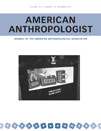
AMERICAN ANTHROPOLOGIST
Uncovering the rich tapestry of human experience.American Anthropologist is a prestigious journal published by Wiley, dedicated to advancing the field of anthropology. With a rich publishing history dating back to 1888, it has become a leading platform for scholarly discourse, showcasing innovative research and diverse perspectives from around the globe. The journal holds impressive ranks within its categories, being recognized as Q1 in both Anthropology and Arts and Humanities, alongside a notable Scopus ranking of #36 out of 502 in Social Sciences. Its robust impact in academia is reflected in its emphasis on interdisciplinary approaches that resonate within the fields of social science and humanities. Researchers and students alike are encouraged to contribute to this vital resource that continues to shape anthropological thought and practice. For those interested, the journal is tailored for non-open access, ensuring the curation of high-caliber scholarly work accessible to a wide audience while supporting the standards of peer-reviewed publications.

Forensic Sciences Research
Pioneering Research for a Safer TomorrowForensic Sciences Research is a distinguished open-access journal published by Oxford University Press, dedicated to the interdisciplinary field of forensic sciences. Since its inception in 2016, the journal has rapidly established itself as a vital resource for researchers, professionals, and students in areas including analytical chemistry, anthropology, biochemistry, genetic studies, and various branches of forensic medicine. With an impressive range of impact factor metrics across multiple categories—including Q1 rankings in Anthropology for 2023—this journal provides unparalleled access to high-quality research while facilitating the dissemination of innovative ideas and methodologies in forensic science. Researchers benefit from the journal's extensive Scopus ranking, which showcases its influential position within the academic community. The open-access model allows global accessibility, ensuring that vital forensic research reaches a diverse audience and contributes to advancements in public safety and legal processes. For those engaged in the practical realities of forensic investigation or the theoretical underpinnings of the field, Forensic Sciences Research is an indispensable journal that continues to advance knowledge and foster collaboration within the forensic community.
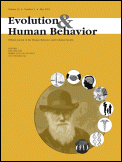
EVOLUTION AND HUMAN BEHAVIOR
Advancing Insights into the Evolutionary Roots of BehaviorEVOLUTION AND HUMAN BEHAVIOR, published by Elsevier Science Inc, is a leading interdisciplinary journal that explores the intricate relationships between evolutionary processes, human behavior, and cognition. With an impressive impact factor reflecting its rigorous peer-reviewed content and high citation rates, this journal falls in the prestigious Q1 quartile across multiple categories including Arts and Humanities, Ecology, Evolution, Behavior and Systematics, and Experimental and Cognitive Psychology, solidifying its critical role in advancing research in these fields. Since its inception in 1997 and moving towards 2024, it has consistently provided a platform for innovative research and insights, attracting contributions from a diverse range of disciplines. The journal is accessible through various open access options, ensuring that groundbreaking research is widely disseminated for maximum impact. Researchers, professionals, and students alike benefit from the cutting-edge studies published within, making EVOLUTION AND HUMAN BEHAVIOR an essential resource for those looking to deepen their understanding of the evolutionary context of human actions and interactions.
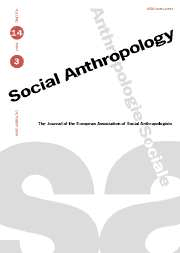
Social Anthropology
Unraveling the Threads of Social PracticeSocial Anthropology is a leading journal published by BERGHAHN JOURNALS, focusing on the diverse and dynamic field of anthropology. With an ISSN of 0964-0282 and an E-ISSN of 1469-8676, this open-access journal has been a cornerstone of scholarly communication since its inception in 1982, becoming fully accessible to the public since 2022. Situated in the United States, the journal aims to disseminate high-quality research that explores sociocultural dimensions of human behavior across various contexts, addressing pressing contemporary issues through a multidisciplinary lens. With impressive rankings, including Q2 in Anthropology and Arts and Humanities, and strong positions in Sociology and Developmental Psychology according to Scopus metrics, Social Anthropology serves as an essential platform for researchers, professionals, and students committed to advancing our understanding of social practices and cultural norms. Its commitment to fostering intellectual discourse makes it a vital resource for those seeking to deepen their knowledge and insight into the anthropological landscape.